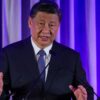Technology
The load-loss drug increase has turn out to be some of the web’s greatest scams
A manufacturing sequence of Wegovy injection pens for the Asian marketplace on the Novo Nordisk A/S pharmaceutical production facility in Hillerod, Denmark, on Wednesday, Nov. 27, 2024.
Bloomberg | Bloomberg | Getty Pictures
One interpretation of the regulation of provide and insist is that after call for outstrips provide, scammers get busy. That’s undoubtedly the case with the super-popular weight-loss medicine from Eli Lilly and Novo Nordisk.
As thousands and thousands of American citizens are prescribed injectable Ozempic and Mounjaro to regard kind 2 diabetes, and Wegovy and Zepbound for weight problems — and numerous extra with out prescriptions search them as “vanity drugs” to reduce uninvited kilos — the producers can’t retain up manufacturing. The GLP-1s, as they’re identified, are dear, too, and insurance coverage ceaselessly doesn’t barricade them, supplied shoppers can in finding them.
That confluence of things has laid the groundwork now not just for a complicated on-line market for compounded variations of the medicine — allowed through the Meals and Drug Management when proprietary components are enthusiastic to be in snip provide — however a proliferation of nefarious scams providing to promote each brand-name and counterfeit GLP-1s on web pages and social media platforms.
Customers have gained Lilly- and Novo-branded GLP-1s from unauthorized dealers, counterfeit variations, utterly other recoveries or not anything in any respect — alternative than a dear scam. Most annoying, Novo instructed CNBC that as of mid-November, it’s conscious about 14 deaths and 144 hospitalizations of family who had taken compounded semaglutide, the energetic pharmaceutical element in Ozempic and Wegovy. It not too long ago requested the FDA to restrain the copycat medicine.
Inside the date yr, cybersecurity mavens, shopper advocates, pharma researchers and media investigators have exposed ratings of accounts and content material on TikTok, Fb, Instagram and alternative social media platforms, in addition to diverse web pages, the place sinister actors were doing industry, a lot of it unlawful or no less than unethical.
In Would possibly, a joint investigation through the nonprofits Digital Citizens Alliance and Coalition for a Safer Web evident how shoppers are flocking to TikTok — which faces an unsure week nearest a federal courtroom on Friday guarded a regulation that may search to restrain the corporate within the U.S. on Jan. 19 — and alternative social media platforms and internet sites to buy branded and illicit GLP-1s, ceaselessly with out a prescription. In step with the document, scammers form accounts promising to promote the medicine for between $200 and $400 for a year’s provide — a long way beneath marketplace costs — paid via Zelle, Venmo and PayPal instead than conventional bank cards to be able to steer clear of monitoring.
“Scammers take advantage of human emotion and human want, and the emotion and want now is that everybody wants to lose weight,” stated Eric Feinberg, vp of content material moderation for the Coalition for a More secure Internet. “It’s a perfect audience to use online to take advantage of people psychologically and emotionally.”
A familiar ruse the investigation uncovered used to be dealers announcing the medicine had been coming from in a foreign country and next claiming that the series used to be held up in customs, requiring an spare $300 to $500 fee to drop it. The scammers had been devious, stated Tom Galvin, govt director of Virtual Electorate Alliance. “They send a tracking number from a delivery service that shows you where your package is, but the tracking number is BS.” Virtual Electorate shelled out simply over $3,000 to buy GLP-1s, and but the cash yielded disagree deliveries of the medicine.
Refuse-delivery ploys can actual a significant monetary toll on sufferers, however “the more scary ones are where you do get a product and don’t even know whether you can trust [it] or if it’s a valid company,” stated Abhishek Karnik, director for blackmail analysis and reaction for cybersecurity company McAfee.
Phishing for weight-loss drug sufferers
Monitoring task over the primary 4 months of this yr, McAfee’s Warning Analysis Workforce exposed simply how prolific weight-loss scams have become throughout sinister web pages, rip-off emails and texts, posts on social media and on-line market listings. From January via April, McAfee researchers came upon 449 dangerous site URLs and 176,871 unhealthy phishing makes an attempt targeted round Ozempic, Wegovy and semaglutide, an building up of 183% in comparison to October via December 2023.
Karnik’s crew has endured to watch those prison actions. “We’ve identified [a total of] 367,000-plus phishing attempts, and between May and August, the number of [risky] URLs we found increased by 135%,” he stated.
JAMA Network Open in August printed the result of a learn about through a world team of researchers who searched the worldwide web to ferret out web pages for on-line pharmacies promoting semaglutide on the market. Some of the 317 operations discovered, greater than 42% had been unlawful, working with out a legitimate license, promoting recoveries with out prescriptions and delivery unregistered and falsified merchandise. Six purchases had been made, however most effective 3 had been delivered.
A contemporary CNBC investigation explored the murky global global of counterfeit weight-loss medicine. Amongst its findings, investigators recounted the seizure in the United Kingdom terminating yr of masses of what gave the look to be Ozempic pens, however had been in truth insulin pens relabeled as Ozempic. Additionally they came upon from Lilly that its retatrutide, a copy GLP-1 drug nonetheless in medical trials and now not FDA-approved, used to be being advertised to the crowd.
Counterfeits and diverted medicine — branded GLP-1s offered at the lightless marketplace — originate from many nations, together with Bharat, China, the United Kingdom, Mexico and Turkey. One of the crucial locations the place they construct their approach to the U.S. used to be Untouched York’s JFK Global Airport. In step with the U.S. Customs and Border Coverage, since January 1, the company had made greater than 198 seizures of goods categorised as Ozempic.
In accordance with this glut of fraudulent task, social media corporations and internet operators have hired human screens and gadget generation to spot and close unwell on-line scammers. A TikTok spokesperson, with out detailing its numerous tracking efforts, referred to the corporate’s family tips. “We strictly prohibit the trade of drugs, and we do not allow attempts to defraud or scam members of our community,” the spokesperson stated. “Our advertising policies also prohibit the advertising of weight-loss products, including weight-loss injections and fat-burning pills.”
Regardless of reliable insurance policies, on the other hand, undeterred violators in finding workarounds when their accounts are shuttered. They could arrange some other account with the drug names misspelled, areas between letters or mash-ups of semaglutide and terzepitide. Many instruct consumers to direct message them or ship hyperlinks to Telegram and alternative unlit web pages that encrypt content material and serve anonymity.
“The social media platforms are the new street corners for drug dealers, and they move from place to place,” Galvin stated. “It’s a game of whack-a-mole.”
Baggage of counterfeit Novo Nordisk A/S Ozempic and Wegovy, foreground, and alternative pretend medicine at a deposit operated through the United Kingdom’s Medications and Healthcare Merchandise Regulatory Company (MHRA) in London, UK, on Monday, Feb. 27, 2024. The United Kingdom process power tracks unwell unlawful web pages, screens social media or even carries out raids to stamp out gross sales of faux “skinny jabs” as each arranged crime and unscrupulous lone marketers glance to capitalize at the weight-loss frenzy.
Bloomberg | Bloomberg | Getty Pictures
For this newsletter, CNBC discovered greater than a quantity TikTok accounts that gave the look to be promoting GLP-1s in violation of its insurance policies, together with @ozempic_weightloss, @sema.irel and @semaglutideandtr. Quickly nearest relaying the guidelines to TikTok, we had been instructed that each one have been got rid of, apart from one, which used to be now not in violation.
The popular compounding of GLP-1s is some other contributor to the dodgy market for the medicine. In April and December of 2022, respectively, the FDA enthusiastic that semaglutide and tirzepatide had been in snip provide, opening the floodgates for compounding pharmacies and outsourcing amenities to build, distribute and marketplace copies, most often offered via telehealth corporations, scientific spas and wellness facilities.
Compounded GLP-1s, not like Lilly’s and Novo’s manufacturers, are not FDA-approved, which means that they don’t go through the company’s overview for protection, effectiveness and component earlier than they’re advertised. In lieu, the FDA and condition forums of pharmacy sign in, license and investigate cross-check compounding amenities and components. And age some compounders meet regulatory necessities, reminiscent of Henry Meds, Noom Med, Ro and Hims & Hers Fitness, many others don’t.
Publicly traded Hims & Hers introduced its gender-focused telehealth platform in 2017, including compounded semaglutide to its weight-loss program this date Would possibly. “We waited until we were able to find the right compounding partner,” stated Dr. Patrick Carroll, the corporate’s important medial officer. But even so that spouse, BPI Labs, Hims & Hers got some other, MetasourceRx, in September. The corporate additionally sells branded Ozempic and then yr will deal liraglutide, the primary generic GLP-1.
FDA scrutiny
Within the intervening time, the FDA is investigating the sinister actors within the compounding global. “Purchasing prescription drugs from unregulated, unlicensed sources without a prescription is risky,” a spokesperson for the company instructed CNBC. “We urge shoppers to keep an eye on and to make use of guidelines gear from the FDA’s BeSafeRx marketing campaign to backup them safely purchase medicine on-line.”
In Would possibly, the KFF Health Tracking Poll discovered that about one in 8 adults (12%) stated that they had taken a GLP-1 drug, with about part, or 21 million, actively the use of the recoveries. Just about 80% bought the medicine or a prescription for them — at a price between $936 to $1,349 consistent with year earlier than insurance plans, rebates or coupons — from a number one offer physician or a consultant, in step with the survey. Fewer reported getting them from a web based supplier or site (11%), a scientific spa or aesthetic scientific middle (10%), or from elsewhere (2%). However that doesn’t depend the inestimable choice of people who have got GLP-1s with out prescriptions via unregulated on-line channels and illicit on-line compounding pharmacies, many working in a foreign country.
Generation social media corporations police unlawful dealers of GLP-1s, masses of influencers are touting the drugs and their trips the use of them around the platforms with impunity, in step with a Speedy Corporate document. Many influencers are recruited and paid through telehealth corporations.
In the meantime, family names were more and more talking out about their private utility of those medicine, which will increase familiarity and interest some of the crowd. In October, Population profiled 64 celebrities — together with Kathy Bates, Elon Musk, Oprah Winfrey, Andy Cohen, Billie Jean King and Rob Lowe — who’ve mentioned their weight-loss drug reviews, most commonly on social media.
These days, Lilly’s and Novo’s GLP-1s are prescribed just for kind 2 diabetes and weight problems. However as researchers in finding spare statuses that may be handled with the medicine — together with cardiovascular condition, kidney condition, dementia and habit, and maximum not too long ago even knee ache — prescriptions will building up exponentially.
In September, an article in the Annals of Pharmacotherapy warned towards producers that utility a prison loophole to promote vials containing semaglutide and tirzepatide to shoppers with out a prescription through mentioning that the medicine are for “research purposes only” and/or “not for human consumption.” The authors performed an web seek for such scofflaws, uncovering 40 web pages promoting what had been categorised as “peptides” to shoppers.
The FDA has despatched warning letters to a handful, together with Miami-based US Chem Labs in February, bringing up a number of violations and inquiring for motion inside 15 days. As of Dec. 6, CNBC discovered that the corporate still listed compounded semaglutide as to be had on its site. US Chem Labs may just now not be reached through telephone and an e-mail request for remark used to be now not returned through press date.
The authors of the Annals of Pharmacotherapy article additionally recognized 3 corporations that had been promoting GLP-1s on Fb, owned through Meta. “Our policies prohibit content that defrauds people by promoting false or misleading health claims, including those related to weight loss, and we remove this kind of content when we become aware of it,” a Meta spokesperson instructed CNBC. CNBC therefore despatched Meta the names of the 3 corporations, and a number of other days nearest their Fb pages had been got rid of.
Eli Lilly, Novo Nordisk struggle with copycat medicine
Employees travel date production apparatus at Eli Lilly & Co. production plant in Kinsale, Eire, on Sept. 12, 2024. Lilly has been bulking up its manufacturing capability since 2020, making an investment greater than $17 billion into creating pristine vegetation and increasing current amenities for the weight-loss and diabetes medicine which might be anticipated to turn out to be probably the most best-selling drugs of all date.
Bloomberg | Bloomberg | Getty Pictures
Lilly and Novo are in a dilemma relating to compounders. The copycats have stuffed a void age the branded GLP-1s are in insufficiency, attracting sufferers who can’t get admission to or find the money for them.
However now the producers need their domain names to themselves. Lilly has despatched cease-and-desist letters to diverse compounding dealers, and each corporations have filed proceedings towards diverse compounding pharmacies, alleging trademark infringement and misleading advertising.
On October 2, the FDA declared that Lilly’s tirzepatide used to be not in snip provide, ostensibly placing compounders of that element into bankruptcy. Two weeks nearest, despite the fact that, nearest a crowd outcry from compounders’ sufferers and a federal lawsuit introduced through compounding pharmacies, the FDA backtracked, announcing it could reevaluate whether or not the drug is to be had and construct a choice in mid-November.
But, on November 22, the FDA stated it used to be nonetheless assessing the situation and assuredly not to tug motion towards compounders of tirzepatide till December 19, until the company makes an previous determination.
Novo’s semaglutide remains to be indexed as “currently in shortage” through the FDA, even supposing the company additionally lists Ozempic and Wegovy as “available.” A Novo Nordisk spokesperson instructed CNBC, “It’s important to note that availability doesn’t always mean immediate accessibility at every pharmacy. Patients may experience variability at specific locations, regardless of whether a drug is in shortage.”
Lilly and Novo have advocated for broadening insurance plans for the medicine, and the Biden management not too long ago proposed that Medicare and Medicaid lengthen their protection for weight problems recoveries. Even though that plan may well be scuttled through the incoming Trump management. Robert F. Kennedy, Jr., Trump’s nominee to go the Segment of Fitness and Human Products and services, has advised that weight problems must be tackled via wholesome consuming, now not medicine.
The weight problems drug marketplace volatility has proven up in fresh profits. In its third-quarter document on October 30, Lilly fell snip of benefit and income expectancies, in part because of disappointing gross sales of its GLP-1s, whilst call for for them endured to bounce. A presen nearest, Novo reported third-quarter profits in sequence with expectancies, reinforced through powerful gross sales of Ozempic and Wegovy. Nevertheless, the Danish corporate narrowed its 2024 full-year expansion steerage, reflecting, in step with a remark from the corporate, “expected continued periodic supply constraints and related drug shortage notifications.”
Each pharma giants proceed to take a position billions to extend manufacturing amenities and capability. This presen, Lilly stated it used to be making an investment $3 billion to extend weight problems drug manufacturing at a Wisconsin plant.
Regardless, call for for GLP-1s — regardless of in the event that they’re branded, compounded or counterfeit or the place they’re bought from — is bound to retain rising. That can put extra drive on social media platforms and internet operators to defend towards scams.
Galvin advised that the firms wish to paintings in combination to spot scammers as they navigate between platforms to steer clear of detection. “Too many platforms look at this as a PR problem and not an internet safety problem,” he stated. “If they were collaborating with each other to identify the bad actors and shared that information, people would find a lot less of them.”





